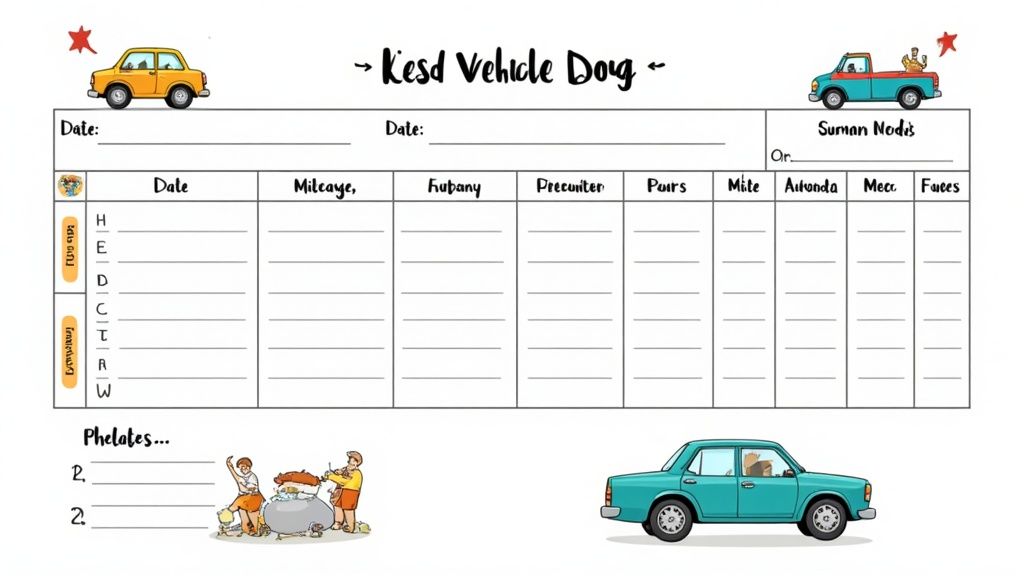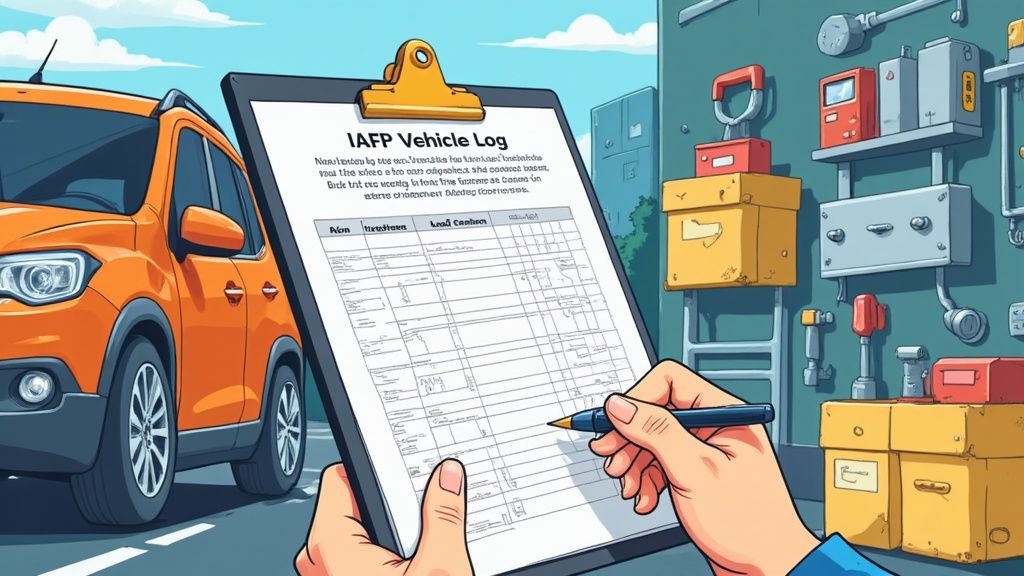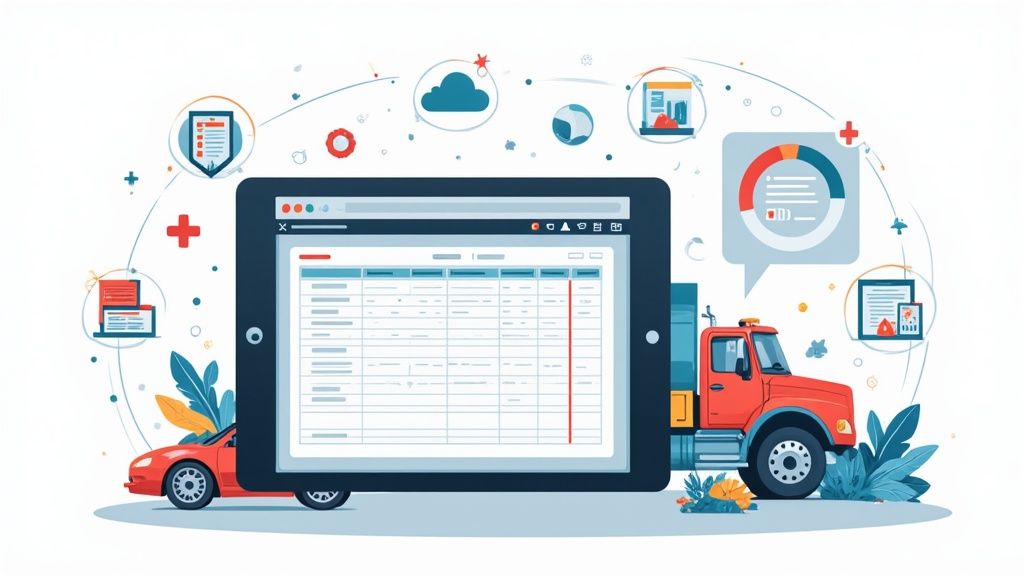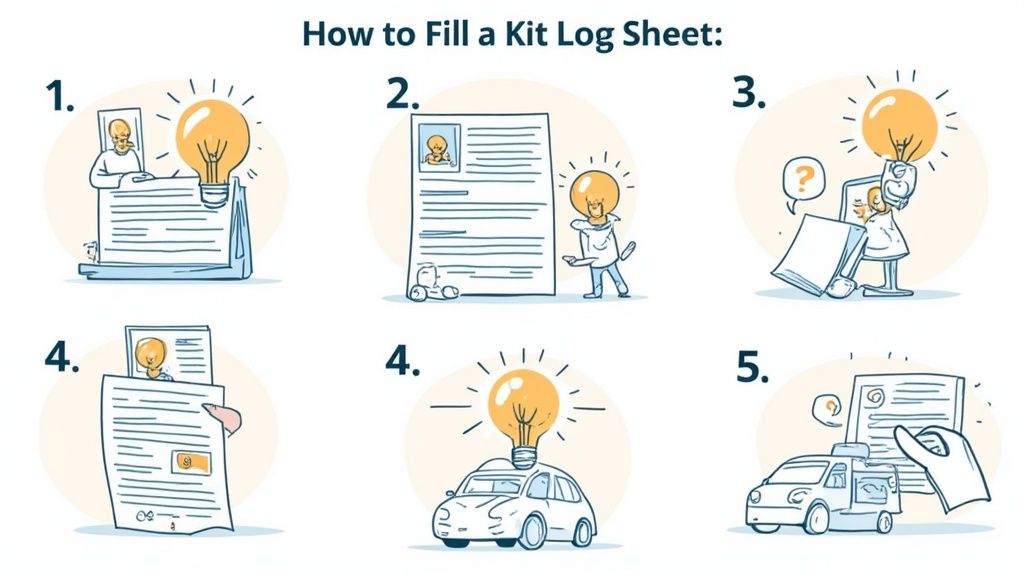
Vehicle Log Sheet Playbook: Proven Strategies for Modern Fleet Management
Breaking Down Vehicle Log Sheet Fundamentals
A vehicle log sheet lies at the heart of proper fleet management and vehicle record keeping. These detailed records track every aspect of vehicle operations - from daily mileage to routine maintenance, fuel usage, and repairs. For both individual vehicle owners and fleet managers, maintaining thorough logs provides key insights into performance, costs, and maintenance needs over time.
Essential Components of a Vehicle Log Sheet
An effective vehicle log sheet captures several key data points that, when tracked consistently, paint a clear picture of vehicle health and usage patterns:
-
Date and Time: Each entry must include when the activity occurred. This chronological record helps identify patterns and track service intervals. For instance, logging fuel fill-up times reveals fuel consumption trends and highlights potential issues.
-
Mileage: Recording odometer readings is essential for multiple purposes - scheduling maintenance, monitoring fuel efficiency, filing taxes, and maintaining warranty coverage. Regular mileage tracking creates an accurate history of vehicle usage.
-
Fuel Consumption: Tracking fuel purchases with details like quantity, cost, and mileage provides insights into efficiency trends. This data quickly surfaces mechanical problems or inefficient driving habits that increase fuel costs.
-
Maintenance and Repairs: Document all service work including dates, mileage, specific maintenance performed, parts replaced, and service provider details. These records support warranty claims, preserve resale value, and enable proactive maintenance planning.
-
Driver Information: For multi-driver vehicles, logging who operates the vehicle ensures accountability and allows managers to monitor individual driving patterns and policy compliance.
Why Basic Mileage Tracking Isn’t Enough
While tracking mileage is important, it only tells part of the story. A complete vehicle log provides deeper insights into overall performance and operating costs. This information helps businesses make smart decisions about maintenance timing, vehicle replacement, and driver training. Proper documentation also ensures tax compliance and proves proper vehicle care during audits. According to recent data, the vehicle tracking system market reached USD 21.54 billion in 2022, showing growing demand for comprehensive vehicle data management.
Going beyond basic mileage logs enables prevention of costly repairs through early problem detection. For example, when fuel consumption data is analyzed alongside mileage, managers can spot efficiency declines that signal mechanical issues before they become major problems. This proactive approach to maintenance, guided by detailed log data, helps extend vehicle life and reduce repair costs. A well-maintained vehicle log sheet becomes an invaluable tool for optimizing fleet operations and controlling expenses over time.
Designing Log Sheets That Drive Results

A thoughtfully designed vehicle log sheet does more than just track information - it helps organizations save money and operate more efficiently. The way you structure and format your log sheets directly affects how well your team uses them and the quality of data you collect. Let’s explore practical ways to create log sheets that your team will actually use consistently.
The Psychology of User Compliance
Getting reliable data starts with making log sheets that people want to use. Think about tax forms - when they’re overly complex, people tend to rush through them or avoid them altogether. The same principle applies to vehicle log sheets. If drivers have to spend too much time filling out complicated forms, they’re more likely to skip entries or make mistakes. Clear, simple designs encourage proper usage and result in more accurate records.
Proven Formats for Effective Logging
Simple table layouts work well for most vehicle logs, with columns for key data like dates, times, mileage, fuel use, and maintenance notes. This format makes it easy to enter information and review records at a glance. Adding checkboxes or preset options for routine items can speed up the process and prevent errors. Different businesses have different needs though - a delivery company might need extra sections for tracking packages and confirming deliveries.
Practical Templates and Adaptability
Starting with a template can help ensure your log sheets are consistent and include all essential information. Many ready-to-use templates are available online that you can modify for your specific needs. The key is choosing a template that captures the right data for your operations, whether that’s driver IDs, vehicle details, or route information. Good templates provide structure while remaining flexible enough to accommodate your unique requirements.
Moving Toward Digital Solutions
While paper logs are still common, digital tracking tools offer major advantages. Software designed for fleet management can automatically calculate totals, generate reports, and connect with GPS systems. For example, Auto Service Logger helps businesses track maintenance records digitally and create custom reports. Digital solutions reduce manual data entry, minimize errors, and make it easier to analyze information and spot trends. This helps fleet managers make better decisions based on accurate, up-to-date data from their vehicle logs.
Digital Solutions for Modern Fleet Management
As businesses evolve, fleet managers are discovering the real advantages of moving beyond basic paper vehicle logs to digital systems. While traditional paper records have been reliable, modern digital tools provide much more capability for tracking, analyzing, and optimizing fleet operations. This shift enables managers to take a more data-driven, forward-looking approach.
The Value of Digital Vehicle Log Sheets
Digital vehicle logs address many limitations of paper-based systems. For instance, automated data capture eliminates time-consuming manual entry and reduces errors. Managers can quickly generate reports to spot patterns in fuel usage, maintenance expenses, and driver performance - leading to smarter operational choices. When integrated with GPS tracking and other fleet tools, digital logs provide a complete picture of vehicle activities. This comprehensive view helps optimize routes, monitor drivers, and boost overall efficiency.
Selecting an Effective Digital Solution
Finding the right digital log system starts with evaluating your specific needs. Small fleets may only need a basic mobile app, while larger operations often require advanced software with extensive analytics and integration features. Key capabilities to look for include automatic mileage tracking, instant reporting, customized alerts, and driver messaging tools. Solutions like Auto Service Logger provide options suited to different fleet sizes, with features such as vehicle-specific reports and secure data storage. This allows companies to implement technology that matches their exact requirements and budget.
Combining Digital and Paper Methods
Moving to digital systems doesn’t mean immediately abandoning all paper processes. Many fleets succeed with a combined approach during the transition period. For example, drivers can complete paper inspection checklists while recording mileage and fuel data in an app. This gradual shift helps staff adapt to new technology while maintaining complete records. Keeping certain paper elements, like delivery signatures, can provide helpful backup during the changeover to fully digital vehicle logs.
Success Stories From Digital Adoption
Many businesses have seen strong results after implementing digital vehicle logs. For example, a transport company that added GPS-integrated digital logging cut fuel costs by 15% through better routing and driving habits. A construction firm used a digital platform to improve maintenance scheduling - reducing vehicle downtime by 20% and extending equipment life by automating service reminders based on usage data. These real examples show how digital vehicle logs deliver practical benefits across different industries. The results demonstrate that modernizing fleet management with digital tools leads to more efficient operations and reduced costs. Making this technology transition represents a practical step toward running a more effective and profitable fleet.
Maximizing Fleet Efficiency Through Strategic Logging

Simply collecting data in vehicle log sheets isn’t enough - the real value comes from analyzing and applying those insights to improve fleet operations. Smart fleet managers know that taking a data-driven approach is essential for staying competitive and controlling costs.
Turning Raw Data Into Actionable Insights
While vehicle log sheets contain valuable information about fleet operations, the data only becomes useful when properly analyzed to uncover key patterns. For example, tracking fuel consumption alongside mileage can reveal early warning signs of mechanical issues before they become major problems. Similarly, examining driver behavior data helps identify specific areas where training could improve safety and fuel efficiency. This targeted approach is far more effective than making changes based on guesswork.
Fleet managers can use log data to spot trends in driving habits, routes, and vehicle performance. By connecting these dots, they can make informed decisions about everything from maintenance scheduling to driver coaching. The goal is to move from reactive management to proactive optimization based on real operational insights.
Optimizing Maintenance Schedules With Log Data
Vehicle logs are essential tools for developing smart maintenance plans. Rather than waiting for breakdowns, managers can use mileage and service records to schedule preventive maintenance at optimal intervals. It’s similar to getting regular health checkups - addressing small issues early prevents costly problems later. Well-maintained logs give fleet managers the foresight to plan maintenance efficiently and minimize unexpected downtime.
Using Vehicle Log Sheets for Cost Control
Vehicle logs provide clear visibility into where money is being spent across the fleet. By tracking expenses like fuel, repairs, and other operational costs, managers can identify opportunities to reduce spending. For instance, if logs show consistently high fuel costs on certain routes, they can investigate potential causes like inefficient routing or fuel theft. This detailed cost tracking is only possible with consistent, accurate logging practices.
Practical Frameworks for Data Analysis
Fleet managers don’t need complex analytics to get value from their log data. Simple approaches like regularly reviewing key metrics - fuel efficiency, maintenance costs per mile, vehicle downtime - can reveal important patterns. Tools like Auto Service Logger help automate data collection and reporting, making it easier to spot trends. The key is establishing consistent processes to collect, analyze and act on the insights hidden in everyday vehicle logs. When used strategically, this data becomes a powerful tool for improving fleet efficiency and controlling costs.
Navigating Compliance and Legal Requirements

Keeping detailed vehicle log sheets is essential for following legal requirements and protecting your business. Whether managing a fleet or tracking a single vehicle, proper documentation helps prevent audit issues while creating clear records of your operations. Good record-keeping systems make compliance straightforward and protect your organization.
Understanding Legal Frameworks for Vehicle Logs
Each industry and location has specific rules for vehicle logs that you must follow. For instance, commercial trucking companies in the US need to follow the Federal Motor Carrier Safety Administration (FMCSA) Hours-of-Service rules, which require electronic logging devices to track driving time. Tax regulations also require careful mileage records if you plan to claim business vehicle expenses. Missing these requirements can result in fines and legal problems, so research which rules apply to your situation.
Essential Documentation for Compliance
Your vehicle log sheets need several key pieces of information to stay compliant. Accurate mileage records form the foundation - they prove where vehicles have been and when. Fuel usage data helps show efficient management and supports tax deductions. Service records, including maintenance dates and repairs, demonstrate proper vehicle care while protecting warranty coverage and resale value.
For companies with multiple vehicles, including driver information helps track policy compliance and manage risk. Recording driver details allows you to monitor behavior, ensure safety rule compliance, and run your fleet effectively. By maintaining detailed records, you can spot potential issues early and address them before they become problems.
Structuring Your Logging System for Audits
A well-organized system makes audits much easier to handle. Whether you use paper or digital logs, your records should be easy to find and review. Set up a system that lets you search records by date, vehicle, and driver. For example, if an auditor needs maintenance records for a specific truck from last quarter, you should be able to pull those quickly. Digital tools like Auto Service Logger offer helpful features like vehicle-specific reports and secure storage. Teaching staff proper logging methods also helps audits run smoothly.
Record Retention and Data Security
Following proper record storage rules is key for compliance. Know how long you need to keep vehicle logs based on regulations. Create clear processes for storing old records, whether in paper files or digital systems. When using digital logs, protect sensitive information with strong security measures. Choose logging software with good data encryption and access controls to keep information safe. This protects your organization from data leaks while building trust with drivers and other stakeholders. Good record management shows your commitment to compliance and helps defend your interests.
Building Sustainable Logging Systems That Last

Creating an effective vehicle log sheet system requires more than selecting forms or software - it needs a well-planned foundation of consistent practices, engaged staff, and adaptable processes. When organizations focus on building sustainable logging practices from the start, they set themselves up for reliable record-keeping that delivers value over many years.
Training Your Team for Long-Term Success
The quality of a vehicle log sheet system depends entirely on the accuracy and completeness of the data being recorded. This is why thorough staff training makes such a difference. Beyond just teaching the mechanics of filling out forms, effective training helps employees understand why careful logging matters. For instance, showing how fuel records directly impact cost savings or how maintenance logs prevent expensive repairs helps staff see the real value of their record-keeping efforts. When employees grasp the “why” behind logging requirements, they take more ownership of the process.
Ensuring Ongoing Compliance
Maintaining compliance takes active oversight and regular review. Conducting periodic audits of vehicle logs helps identify areas where employees might need a refresher on procedures or where the system itself could be improved. Simple spot checks for completeness and accuracy go a long way. Just as important is creating an environment where staff feel comfortable raising concerns or suggesting ways to make the logging process work better for everyone.
Adapting Your System as Your Fleet Grows
As operations expand, logging systems need to evolve too. This might mean moving from basic spreadsheets to dedicated fleet management tools, or adding new data points like GPS tracking information. The key is making thoughtful updates that enhance rather than complicate your processes. A flexible system that can grow with your business helps ensure you maintain good records even as your fleet changes.
Measuring the Impact of Your Logging System
Regular evaluation helps identify what’s working and what needs adjustment. Focus on concrete metrics like completion rates, data accuracy, and time spent logging. For example, tracking the percentage of properly completed logs shows compliance levels, while analyzing fuel use versus mileage can reveal maintenance needs or driver training opportunities. Using real data to guide improvements keeps your system practical and effective.
By focusing on thorough training, consistent compliance, smart adaptation, and data-driven evaluation, you can build a vehicle log sheet system that delivers lasting value. Experience the benefits of organized maintenance records with Auto Service Logger. Sign up for a lifetime membership today and unlock the full potential of efficient vehicle tracking: https://autoservicelogger.com/